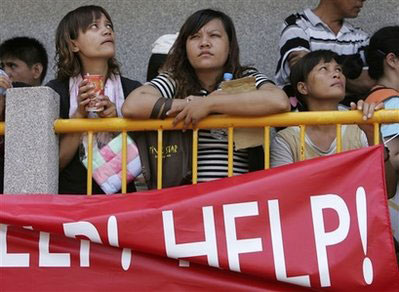The Philippines is calling for developed countries to make "deep and early cuts” of greenhouse gas emissions to stem the impact of climate change in the wake of its worst flooding in decades.
But one of the world's leading emergency response agencies is saying that disaster risk reduction funding must be priority for the island nation and that the recent series of disasters throughout Asia should be a wake-up call to the global community.
"Disasters are becoming increasingly costly in terms of lives and destruction," commented Melisa Bodenhamer, a Disaster Risk Reduction (DRR) expert with aid agency World Vision.
“DRR activities can help reduce the toll on human lives and government budgets,” she added. “In fact, research has shown that every $1 spent on disaster risk reduction activities saves nearly $7 in emergency response funds."
Notably, however, a proposed national law on DRR in the Philippines is currently stalled at the committee level at the Lower House. The DRR Bill would put a priority on disaster risk reduction and management, and it also seeks to institutionalize the disaster risk reduction plans in the federal budget.
"We have been pushing for the passage of this bill for over a decade now," said Minnie Portales, World Vision's advocacy and communications director in the Philippines. "We cannot afford to have another Typhoon Ketsana destroy our property or cause so much suffering to our children and families."
According to the Disaster Risk Reduction Network (DRRNet), the Philippines' vulnerability to disasters has increased immensely throughout the years, resulting in the loss of lives, livelihood, and property.
In light of this, World Vision insists that ensuring sustained political commitment to DRR is critical, not only to reduce losses in a more disaster prone world, but also to prevent natural disasters unwinding progress already made in reducing poverty and suffering.
DRR activities can and do help communities identify and reduce the vulnerabilities families faced by natural disasters, the agency reports. DRR activities include helping communities develop early warning systems, establish risk mapping techniques and hold trainings to teach communities how to reduce their vulnerabilities and protect themselves in the event of a disaster.
World Vision, which has been working with the world's poorest people for more than 50 years, is the lead agency of DRRNet in the Philippines.
The agency’s call to action came just days before a second massive storm, Typhoon Parma, struck the Philippines Sunday, causing widespread flooding and landslides that killed 16.
Eight days earlier, Tropical Storm Ketsana inundated the Philippines capital, Manila, and surrounding provinces, killing at least 288 people and damaging the homes of three million.
Ketsana later went on to strike other Southeast Asian nations as a typhoon, killing 162 in Vietnam, 18 in Cambodia and at least 16 in Laos.















